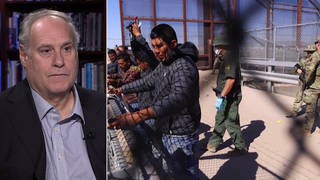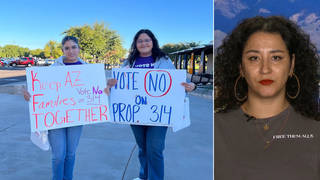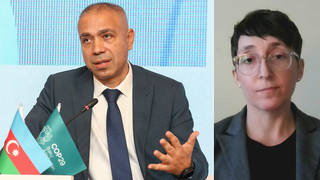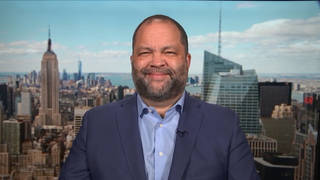
Related
Topics
Guests
- Martina CorreiaTroy Davis’s older sister. She joins us from Atlanta, Georgia, right before she heads to her brother’s clemency hearing. She has been advocating for Troy’s release for the past 15 years.
- Jared FeuerSouthern regional director of Amnesty International USA.
Outcry is growing over the scheduled execution of Troy Davis. He is set to be killed at 7 p.m. on Tuesday for murdering a white police officer. The murder weapon was never found. There’s no DNA evidence or other physical evidence. Seven of the nine non-police witnesses said they were coerced by police and have since recanted their testimony. We speak to Troy’s sister Martina Correia and Amnesty International’s Jared Feuer. [includes rush transcript]
Transcript
AMY GOODMAN: Troy Anthony Davis will be executed tomorrow night at 7:00 p.m. unless the Georgia State Board of Pardons and Paroles commutes his sentence. The 38-year-old African American from Savannah, Georgia, has been on death row for more than 15 years for a murder he says he did not commit.
Davis was convicted in 1991 for the murder of white police officer Mark Allen MacPhail. The prosecution’s case rested entirely on witness testimony. But seven of the nine non-police witnesses said they were coerced by police and have since recanted their testimony. Nine witnesses have also implicated another man in the murder.
Despite this powerful evidence in Davis’s favor, none of it has been heard in a courtroom because of a 1996 law signed by President Clinton called the Anti-Terrorism and Effective Death Penalty Act that restricts federal reviews of state death penalty convictions.
Davis’s case was also compromised because Congress voted in 1995 to eliminate funding for organizations providing legal assistance to indigent death row prisoners. The Georgia Resource Center, which was defending Davis, had its budget cut by over two-thirds, and Davis was unable to introduce the new evidence earlier.
Three weeks ago, the Supreme Court refused Davis’s final request for appeal. His execution date is set for Tuesday, July 17. His clemency hearing begins today at 9:00 a.m. This is the last chance that Troy Davis has to save his life.
Martina Correia is Troy Davis’s older sister. She joins us from Atlanta, Georgia, right before she heads into her brother’s clemency hearing. We welcome to Democracy Now!, Martina.
MARTINA CORREIA: Thank you for having me
AMY GOODMAN: I really appreciate you joining us. I know this is a very difficult time. The hearing is just about to begin in about 45 minutes. Tell us why you have spent this more than 15 years trying to save your brother.
MARTINA CORREIA: Well, I’ve been spending all this time trying to save Troy, because the information and the stuff that they have against him was infactual, and I knew that some of this stuff was coming out was untrue. And so, we just had to try to prove it, and then when the witnesses started coming forward when we were able to get this case investigated, the court system was still refusing to hear it. And so, I’ve been trying so hard for all these years to get someone to listen to the information. Because when you have no gun, no gun powder residue and no physical evidence, and all the witnesses point someone else, how can you still want to execute Troy and say that actual innocence doesn’t matter? And that’s what’s happening in this case. They’re saying that actual innocence doesn’t matter.
AMY GOODMAN: Can you talk about the two jurors who have now come forward saying they want Troy’s life spared?
MARTINA CORREIA: Well, I don’t know who they are, and I’m very happy that they have come forward, and I think right now they think that more jurors have actually come forward. I’m not quite sure of the number. But this is information that they did not have at trial. If they had this information at trial, I don’t think that they would have ever received a conviction for Troy. But there was so much hatred and animosity geared towards Troy for two years in the press in Savannah that it didn’t matter what Troy said in a courtroom. They were out to convict him. The district attorney said they weren’t going to accept anything but death.
And the thing about it is, people really didn’t understand the pressure that the witnesses were put under to lie against Troy. They were threatened with jail time. They were coerced. A lot of them were very young and intimidated. And a lot of them were signing statements. One gentleman signed a statement, and he couldn’t even read and write. So the thing about Troy is they had built his case around Troy, and they couldn’t turn around, and so they really set out to kill Troy from the beginning. And it’s very, very sad, because it didn’t show justice. But all of this information has unfolded, and it’s been unfolding for years. And people have been trying to keep this information hidden, and now that it’s out, they still want to execute Troy.
AMY GOODMAN: The night of the killing of the police officer MacPhail, you were home. You were having a party?
MARTINA CORREIA: No. Actually, I was having a party the next day. I was having a dinner party the next day. But I was home that evening, because usually I work in the day, and I was off on the weekends. I was in the military. I was in the U.S. — United States Army. So we didn’t know about this until, you know, way after this took place the next night sometime. Almost Sunday morning is when I found out about it.
AMY GOODMAN: It was when you saw your brother’s face flashed across the TV screen as you were having dinner?
MARTINA CORREIA: Actually, yes. It was like, well, my mother tried to contact me to let me know what was going on, because I had no idea what was going on, and when I turned on the TV, I saw a picture that they actually took out of my mother’s home, because until then they had no pictures of Troy or anything, and they only had the testimony of this other witness who was on the scene with a weapon. And even the person that was being attacked identified this person. So what happened was, I didn’t know what was going on until my mother contacted me.
AMY GOODMAN: So there was no gun found. Witnesses first said it was your brother, although, as you say now, seven of them have recanted their testimony. Can you talk about the trial itself? Can you talk about who represented your brother, and then the appeals?
MARTINA CORREIA: Well, at trial — OK, well, first of all, the witnesses were identifying someone else at the scene. But it wasn’t until someone went into the police department with a lawyer that the finger was pointed at Troy, and that’s when witness testimony started to change.
But during the trial, we weren’t allowed in the courtroom. Our family had to sit outside on a stone bench. We weren’t even allowed to go in and support Troy. And any of our family that tried to go into the courtroom, they barred us from the courtroom by putting us on the witness list and saying that we had to be sequestered. But we weren’t even sequestered with the rest of the witnesses. We were sat outside the courtroom. But for the courtroom, the courtroom was set up — it was like white and black. It was something like right out of the '40s or ’50s. The victim's family came in with armed guards and people protecting them, and our family sat on a stone bench like we were the enemy of the state. And everyone hated us, vilified us. And our family had never been in any trouble. And so, we — Troy was not able to get a change of venue or anything. So it was very, very bad.
AMY GOODMAN: Interesting, in terms of the number of people who have come out to speak out on behalf of Troy, former FBI Director William Sessions has said, “It would be intolerable to execute a man without his claims of innocence ever being considered by the courts or by the executive.”
MARTINA CORREIA: Yes. And people all over the world are saying the same thing, and they’re always asking this question: “Why doesn’t actual innocence matter?” I mean, we look at the death penalty and all the mistakes that eyewitness recantations have been making, and this is just another tragic mistake. And sometimes when people are forced to say things, you know, self-preservation, when people are afraid, but people have been coming forward. And these witnesses are still afraid. They still feel threatened by what’s going to happen to them by speaking up for Troy. But they still came forward to do it. But no one would listen. And they feel like they’ve stuck their necks out and they’re doing the right thing, but people in the court system are still ignoring them. So we’re really, really trying to save Troy’s life at this point.
AMY GOODMAN: Can you tell us a little about your younger brother? Can you tell us about Troy? He was a coach for the Police Athletic League?
MARTINA CORREIA: Yes, we grew up in a [subdivision called Cloverdale] in Savannah, and they had a sports program led by the police department called the Savannah Police Athletic League. Troy played ball with them, so did I, from age four to age 15, and then Troy became a junior coach with them. And our father was a former police officer. He was a deputy sheriff in Savannah that even worked in a courthouse and protected judges. He was a military man. I was in the United States Army when I grew up. And then Troy became — wanted to go into the Marine Corps.
I had a sister who was paralyzed from the neck down, and Troy gave up going to school in the daytime and went to night school, so that he can help my mother by taking care of my sister. Troy bathed her, he catheterized her, he helped her to walk again. And once our family got back on our feet, then Troy was going to go in the Marine Corps.
But Troy was well known as a protector of the kids in the community. If kids didn’t have money to buy ice cream, he would line all the kids up at the ice cream truck and buy ice cream for them. He would stop fights in the community. And that’s what happened. Troy always used to stand in and try to help other people. And I think that night, if he did not try to stand in to help this homeless man that was being pistol-whipped, Troy wouldn’t have even been on the scene. But he tried to protect someone else, and then he got caught up in this situation.
AMY GOODMAN: In addition to fighting for your brother Troy Davis’s life, Martina, you’re fighting for your own life. You’re battling cancer?
MARTINA CORREIA: Yes, I’ve been battling metastatic breast cancer for six-and-a-half years. In 2001, I was told that I had six months to live, and I asked God to just give me the strength to see my son grow up and watch my brother Troy walk free. And I’ve dedicated my life — even though I have not worked in almost seven years due to constant chemotherapy and treatment, I volunteer in my community, and I work and do human rights work to not only help Troy, but to help other people who are facing the same situation. So my battle is more than just for Troy. My battle is for everyone to fight injustice. But I have been battling, and I am taking chemo. I took chemo last week. That’s why my voice is a little tattered today.
AMY GOODMAN: You’re a spokesperson for Cancer Awareness and Research, and your photo graces the side of a mobile cancer screening station?
MARTINA CORREIA: Yes, my face is on the side of a big mammography van that’s used to give free mammograms for indigent women in my community and the surrounding areas. And a couple of months ago, they actually put a photo of me on the Susan Komen BMW Drive for being the hometown hero for doing all this volunteer work in my community with people with cancer and underserved communities.
AMY GOODMAN: How did the 1996 law change your brother’s chances?
MARTINA CORREIA: Well, the 1996 law is really attacking innocent people. And it has really tattered my brother’s chances, almost given him no chance to bring forward his new evidence. And so, we’re really trying to get people to understand that actual innocence should always matter. And I also want people to understand that we need to change laws, because if we look at people that are being brought to justice for civil rights killings in the '40s and ’50s, and they're 70 and 80 years old, and here it is, Troy is 38 years old and he has a strong case of innocence, and nobody will hear it, because of this anti-terrorism law.
AMY GOODMAN: How do you have the strength to keep going, given your own battle with cancer? And when did you last see your brother?
MARTINA CORREIA: I saw my brother yesterday. And my strength is that we have strong family, we have a strong belief in God, and I do believe that the justice system can work if we allow it to. And I just — you know, my brother Troy is such a wonderful person that he gives me the strength to do this, because he cares more about our family and our health than his own well-being. So he gives me the strength to keep doing this work, and that’s what I do, and I’m going to fight. No what happens tomorrow, I’m going to continue my fight to prove Troy’s innocence.
AMY GOODMAN: Martina, you’re going into the parole board now. What is your message to people throughout the United States, people watching and listening around the world, and that you’re going to deliver to the parole board today?
MARTINA CORREIA: Well, I’m going to talk to them about Troy Anthony Davis and who Troy really is and hope that they will listen to what I have to say. This is the second time that I’ve had to beg for my brother’s life, but I’m going to do it, because he deserves another chance. And I want people around the world to know that they can still send in letters to the parole board, fax letters to the parole board, asking for clemency for Troy Anthony Davis and asking that we get a new trial for Troy Anthony Davis, because he deserves to have his innocence heard. And if these witnesses have come forward, then we deserve to understand what truly happened to Officer Mark MacPhail and that he deserves justice, as well. And I think that they dishonor his memory by not making sure the right person is being put to death.
AMY GOODMAN: Martina Correia, thank you very much for being with us. I know it was tough for you to come on today. In just a few minutes, she goes into the parole board. She was standing outside of its offices in Atlanta, Georgia.
When we come back., we’ll speak with the advocate for Amnesty International, the Southern regional director of the organization who is going into the parole board hearing today. We’re talking about the case of Troy Davis. Stay with us.
[break]
AMY GOODMAN: As we turn back to the case of Troy Davis, on death row, could be executed tomorrow, Tuesday, July 17th, at 7:00 p.m. in Atlanta, Georgia by lethal injection, unless the parole board decides to grant him clemency.
Jared Feuer now joins us from Atlanta. He is the Southern regional director of Amnesty International USA, which has been actively campaigning against the imposition of the death penalty and for clemency for Troy Davis. Welcome to Democracy Now!, Jared.
JARED FEUER: Thank you, Amy. And thank you for covering this very important story.
AMY GOODMAN: Well, thank you for being with us. You’re standing right outside where the hearing will take place, on the street in Atlanta, Georgia. You’ll be going in in a few minutes. Talk about what you see as the most significant legal issues here today.
JARED FEUER: Well, I think what needs to be understood is that, though this case is getting exceptional attention, due in part to Martina’s incredible advocacy, this is not a relatively new or unusual case. What we’re dealing with here is a legal black hole that Mr. Davis fell into.
During his case, because the issues of witness unreliability was not adequately noted — it was noted, but they didn’t do a good job — and because some of the witnesses had not come forward with their statements until afterwards, when they had appeals in the Georgia state system, those appeals were ruled that there was a procedural — that it was procedurally defaulted, because it had been dealt with already by the initial trial. And what the appeals court said is, in essence, “Who are we to second-guess the juries? You already had your shot with the witnesses. Now, if you have anything new, we’ll look at that, but the witnesses are not acceptable.” And Mr. Davis has said on a number of occasions that if there was new DNA evidence, then that would be heard. But the witnesses recanting is Mr. Davis’s evidence, and that will not be heard.
And on a federal level, in 1996 in the wake of the Oklahoma City bombings, President Clinton, pushed by then-Speaker of the House Newt Gingrich, signed the Anti-Terrorism and Effective Death Penalty Act, which basically said that unless a death penalty case involves constitutional issues, unless there was a unconstitutional infringement of the rights of the defendant, the federal appeals court cannot hear it. And so, that closed the channel for Troy Davis on a federal level. And on a state level, it was shut down because the witnesses, the majority of witnesses, had not yet come forward with their recantment, and so everything was closed. And even though the compelling case for innocence exists, it can’t get heard. And that’s why the fail-safe — and the Supreme Court has identified it as the fail-safe — is the executive branch. And in Georgia, the governor has delegated that authority to the Georgia Board of Pardon and Paroles.
And this morning, we’re going to make our case, and we are very hopeful that they will hear it and that they will hear how compelling Mr. Davis’s innocence is. But if not, this is how the death penalty works in America. Tomorrow night at 7:00 p.m. — and the Georgia Board of Pardon and Paroles can make their decision up to 3:00, and then four hours later, if they rule unfavorably, Mr. Davis will be killed.
AMY GOODMAN: One of the two witnesses who has not recanted — seven of nine have, two haven’t — is Sylvester “Red” Coles, the principal alternative suspect, according to the defense, against whom there is new evidence implicating him as the gunman. Nine individuals have signed affidavits implicating Sylvester Coles. Where is he, Jared?
JARED FEUER: I believe that the attorneys have been looking for him. I do not believe that he has been found or that he has noted. What happened was, very shortly after the shooting Mr. Coles went to the police with his attorney and fingered Mr. Davis. And from that point forward, all the police work and everything was focused on Mr. Davis, and Mr. Coles managed to get the spotlight off of him. And since then he’s done a very good job of keeping it off of him.
But you look at the fact that there are nine witnesses who were pointing to Mr. Coles, and of those who point to Mr. Davis, seven out of the nine have recanted. One is Mr. Coles himself, and the other cannot identify the shooter, just the clothes. That’s it. There is no murder weapon. There is no physical evidence. And a man’s life is on the line. And it takes your breath away that our government can take someone’s life based on so little evidence.
AMY GOODMAN: I’m looking at a piece in the Atlanta Journal-Constitution. It says, “If Troy Anthony Davis is executed Tuesday, Tonya Johnson will be in mourning. Not just because she has known Davis since they played together as children. But because she will have to accept that she played a role in his death.
“’It will be hard to live with myself after what I [have] done,’ she says. 'It will be very hard.'
“Hard because Johnson believes Davis is an innocent man. Harder still because she says she did not tell the whole truth to police when they questioned her about the events that took place on a summer night in 1989.
“Fear ate at her soul then, she says.
“She never spoke openly about the murder of Savannah police Officer Mark Allen MacPhail. Not with her friends, not with her family. Only years later did she tell a cousin, who nudged her to 'do the right thing' and step forward.
“Seven of nine key witnesses who implicated Davis in MacPhail’s murder have recanted their testimony since the 1991 trial. Others, like Johnson, later made sworn statements that shifted the blame away from Davis.”
So you have this fight in the — you have the parking lot, Burger King, it’s 1:00 in the morning. Someone has, what, attacked a homeless man. And MacPhail came as the security guard for the Burger King to help him, didn’t take his gun out, and then was murdered right there. And the question was, who was the killer? Troy Davis had no record. And now the witnesses who IDed him, fingered him, seven of the nine are saying that they were pressured. How did the police pressure them?
JARED FEUER: You know, what we have to talk about when we discuss the witnesses is that in some cases they were 16 years old. They had a number of children. Some of them did have prior records. And they were told that if you do not tell us what we want to hear, you will be going away to jail, or we will actually be fingering you. And the witnesses were scared out of their minds. I mean, they had a number of police who would, you know, arrive at their house and tell them, “You sign this, or you’re going to go to jail.” One of the witnesses was given a signed statement, and he can’t even read.
But, you know, there was an officer who was down, and the police really wanted to make sure that they got their suspect. And once Davis was fingered, that’s the story that they went with. And that’s what’s so tragic here, is that everything was pushed into this box, and by the time we found out what was in the box, the federal legislation and the way that the state appeals system works is that you can’t really find out what’s in it. You can’t hear it anymore. It’s you get your one chance, and then that’s it. And we have a death penalty system in this country that favors expediency over getting it right. I mean, that’s the bottom line here, and that’s what Mr. Davis got caught in.
AMY GOODMAN: What about the jurors who are coming forward? The jurors who convicted him voted for the death penalty, now saying no, that if they had known then what they know now, they would not have convicted Troy Davis.
JARED FEUER: And that’s not a new story either. You have in Texas a man by the name of Cantu, who not only did the foreman of the jury say that they made a mistake — and Cantu was executed 13 years ago — but you had the district attorney who said that most likely they made a mistake and an innocent man was executed. This is not a new story. This is the status of the death penalty in the United States. And as much as Troy Davis’s case is incredibly compelling and shows us — it shows us how clearly it is flawed, it is not new. And if we don’t resolve it for Mr. Davis, it will be an issue for somebody else and someone else. And every week, there’s an execution in this country, if not, every couple days. And even though support for the death penalty is an all-time low and even though half as many people are sentenced to death now as were in 1991, when Mr. Davis was, it is still all too frequent.
And so, what I ask people to do is go to Amnesty’s website, amnestyusa.org/troydavis, and they can send a fax through the website, and it will go to the Georgia Board of Pardon and Paroles now. Please send it. And then, after that, we should really have a long look at the Anti-Terrorism and Effective Death Penalty Act both for itself and as an example, as an early precursor for what we’ve seen in this war on terror, where we curtail rights for the name of security and the name of freedom, and then it ends up having much larger consequences than could ever be imagined.
AMY GOODMAN: Several congressmembers are going in to speak, among them Congressmember John Lewis. He’ll be testifying before the parole board. We wanted him on the show today, but he said his first statement he wanted directly to the parole board. William Sessions, big advocate of the death penalty, is calling for clemency for Troy Davis. The former head of the FBI, William Sessions, can you talk about his advocacy here?
JARED FEUER: Right. Well, that’s an example of how Troy Davis’s case is so extreme that it shows that you’re dealing with a flawed system, and the overall goal of Amnesty USA and of most human rights advocates and people who really support human rights is that the death penalty is not an acceptable way for a humane society to treat its people.
But what we really want to do is demonstrate the flaws. And even though Mr. Sessions right now might support the death penalty and other advocates, including perhaps some of your watchers and listeners, might also support the death penalty, our hope is that this case really shows how flawed it is, because humans are flawed, and when you’re dealing with emotions and you’re dealing with a loss and you’re dealing with anger and everything that gets tied into it, you especially, in that case, but in pretty much any case, you’re not going to have all the facts. You’re not going to know exactly what you’re dealing with. We’re a flawed species, and for us to put all our trust in this system, especially a system that favors expediency, is to lead to people being unfortunately executed despite their innocence. And Justice Scalia —
AMY GOODMAN: The number of people who have been executed in Georgia, and also the biggest determinant of who gets the death penalty?
JARED FEUER: Mm-hmm, is race. Forty people have been executed in Georgia; 124 people have been exonerated, six of whom are in Georgia. So, you know, it really is a runaway train. And when we look at the issues of race, we look at the facts that three-quarters of all people who have been executed since the death penalty has been reinstated are African-American. It is a system that is based on those who are most vulnerable, those who do not get that initial good defense, those who become merely suspect and fingered by the police get caught in it, and they don’t have the resources, and we end up not only having a system where we take people’s lives, which we should never do, but we have a system where those whose lives are being taken are those who are most vulnerable.
AMY GOODMAN: Looking at the American Bar Association’s statistics, among all homicides with known suspects, those suspected of killing whites are 4.56 times as likely to be sentenced to death as those who are suspected of killing blacks.
Jared Feuer, as you are about to go into that board hearing right now, your final thoughts on what this board, this clemency board, this pardon and parole board, can do and why they would make a decision that is different from the Supreme Court of the United States?
JARED FEUER: They can grant clemency, and that is our hope. We believe we have — not only do we have, but it just exists — as compelling a case as you can possibly have. There is basically no evidence pointing to Mr. Davis. And our hope is that the Georgia Board of Clemency, as the fail-safe, as the final, final arbiter, will not allow the people of Georgia and the people of America to put someone to death, when there is basically nothing holding him to that crime. We’re hopeful. We’re going to find out very shortly. But this has been a long road, and it’s going to continue long after Mr. Davis.
I really hope your listeners and your watchers will send a fax on behalf of Mr. Davis, let the Board of Pardon and Paroles know, but also look at the Anti-Terrorism and Effective Death Penalty Act and remember that all of the legislation that’s being passed in the wake of September 11 has much larger consequences, including for such issues as the death penalty.
AMY GOODMAN: Jared Feuer, I want to thank you very much for being with us. We will also link to your website, Amnesty International USA’s website. Jared is the Southern regional director of Amnesty International. He now goes into the Sloppy Floyd Administrative Building, where the Georgia Board of Pardons and Paroles will have their hearing. And we will certainly update you on the broadcast tomorrow. He was standing in front of the Capitol building, which is across the street. The Sloppy Floyd administrative board hearing, the building, sits on Martin Luther King Drive in Atlanta, Georgia.












Media Options